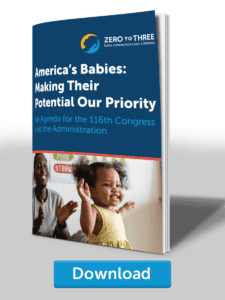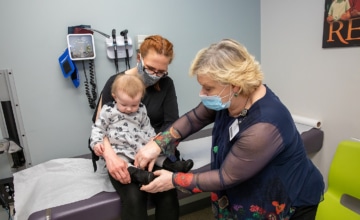A Policy Agenda for the 116th Congress and the Administration
This year, 4 million babies will be born in the United States. Forming more than 1 million new neural connections every second, these babies represent infinite potential.
 Someday, these babies will be the workers who build a strong economy, scientists who make breakthroughs in curing disease, and leaders who provide a vision for the future. As our birth rate stagnates and the rest of the world races to catch up to America’s prosperity, we cannot afford to squander the innate potential of a single child.
Someday, these babies will be the workers who build a strong economy, scientists who make breakthroughs in curing disease, and leaders who provide a vision for the future. As our birth rate stagnates and the rest of the world races to catch up to America’s prosperity, we cannot afford to squander the innate potential of a single child.
But, the story of babies in the first half of this century is one of potential limited. Young children, and particularly babies, are the age group most likely to be poor in America. More than two in five infants and toddlers live in families without enough income to meet basic needs. Food insecurity, unstable housing, or environmental chaos and violence pervade many babies’ lives, creating chronic and unrelenting stress that undermines development. These problems tend to be perceived as urban, when babies and families in rural areas often lack access to jobs and vital services.
Babies of color, who make up more than half of all births, disproportionately lack the resources that allow children and their families to thrive. Discriminatory policies have led to an unequal share of adverse experiences; children of color are more likely to be poor, be born too soon or too small, and live in unsafe environments. Their families face inequities in accessing support that could boost them to a level playing field, such as comprehensive prenatal care and quality early learning experiences.
The science of early development tells us what babies need to thrive: Good Health to ensure strong minds and bodies, Strong Families to provide the nurturing relationships that ensure sturdy neural foundations and resilience, and Positive Early Learning Experiences to shape the burgeoning brain architecture on which all later learning will rest. Research shows that investments that enhance families’ ability to provide these supports will pay dividends. Some of these proven policies are already in place, but at modest funding levels that often only target children deemed “at greatest risk,” reaching only a sliver of those in need. ZERO TO THREE’s policy agenda challenges the 116th Congress and the Administration to reframe how policies approach our smallest, yet greatest resource. Instead of labeling some babies as being “At Risk,” we should stamp on each tiny forehead the words “Unlimited Potential.” That change in perspective leads to policies that have a broader reach, while boosting opportunities for babies and families who have lacked access. Our country will only be strong in 2050 and beyond if we nurture the young children who will shape its future and make their potential our priority.




